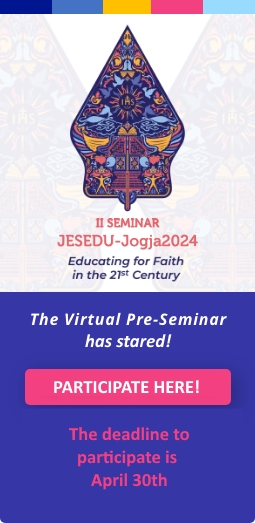Continuing with the Global Series for Teachers New to Jesuit Education, here is article number two, in which I walk you through Fathers General’s Leadership in Contemporary Jesuit Education.
In the Constitutions of the Society of Jesus, St. Ignatius wrote: “In all well-organized communities or congregations there must be, besides the persons who take care of their particular goals, one or several whose proper duty is to attend to the universal good… This person is the superior general.” (#719) In the subsequent numbers of the Constitutions, Ignatius describes some of the characteristics of the office and person of Fr. General: 1. He is elected for life (in recent times they also have the chance to offer their resignation when they feel it is at the service of the Society. The previous three Generals have resigned: Arrupe, Kolvenbach and Nicolás). 2. He is a person of spiritual depth, familiar with God. 3. Leads by example. 3. Endowed with intelligence and judgment…
The General is appointed by a General Congregation (a gathering of Jesuit delegates from around the world) after a period of discernment and prayer and after submitting his name for approval to the Pope. Fr. General has the ultimate responsibility and authority over the Jesuit schools and personally takes some important decisions affecting them: establishing or closing a school, deciding which schools can be officially considered Jesuit, approving some school projects, and establishing the official policies on Education according to the guidelines presented by the General Congregations.
In our cotemporary times we have been blessed by inspiring leaders. Fr. Pedro Arrupe was elected as the 28th General in 1965 and resigned in 1983. As a General, Arrupe exercised an enormous influence on Jesuit Education since he challenged the schools to adapt to the new contexts and form “persons for others” as a response to the call for a faith that does justice: “Our educational goal and objective is to form men and women who live not for themselves but for God and for his Christ…men and women for others… persons who cannot conceive of love of God without love of neighbor” (Promotion of Justice and Education for Justice, 1973, #12).
The challenge to educate for a faith that does justice had an immense impact on the schools and it called for renewal, change and creativity. Arrupe was aware that inertia -simply repeating the past- was not an option: “I caution these men about the danger of inertia. It is absolutely essential that they become more aware of the changes that have taken place in the Church and in the Society, and aware also of their need to keep pace with these changes.” (Our Schools Today and Tomorrow, #54)
The schools responded to this challenge and two new documents capture the response well: The Characteristics of Jesuit Education (1986) and Ignatian Pedagogy: A Practical Approach (1993). These two documents set the tone for the contemporary understanding of Jesuit Education and provided a universal framework that allowed the schools to navigate their local challenges while, at the same time, keeping the unity of all.
Fr. Arrupe led a process of renewal and creativity that is still very much part of our energy today. The following Fr. General, Peter Hans Kolvenbach, was elected in 1983 and resigned in 2008. He had been a university professor for most of his life before his election. His knowledge of the world of education allowed him to lead the process of renewal with authority and expertise. Fr. Kolvenbach continued the process initiated by Fr. Arrupe and highlighted the need to adapt to the new times while making sure that our process remained focused on what is important: “Change for the sake of change is not what we intend. We seek a way to serve more and better while adapting to the circumstances of the time and place according to a truly Ignatian principle.” (Discourse in Caracas, 1998 #18). Fr. Kolvenbach also pointed out that persons for others was better understood as persons for and with others to recognize the communal dimension of our education.
Fr. Kolvenbach also enriched the understanding of Jesuit Education with three further contributions in particular which stand out:
1. He brought forward the idea of an earlier Jesuit (Ledesma,1524-1575) to explain the four dimensions that our education should offer:
- Utilitas (practical dimension): to give students a way of living
- Iustitia (social dimension): to contribute to the right government and the common good
- Humanitas (human dimension): to develop the whole person in his/her human dignity.
- Fides (religious dimension): to serve faith: find God in Jesus.
2. Fr. Kolvenbach proposed a very demanding criterion for our education, the decisive criterion: “we should require all students to use the option for the poor as a criterion, so that they never make an important decision without first thinking how it might affect those who occupy the last places in society.” (Talk in Arequipa, Peru, 1998)
3. Fr. Kolvenbach explained the purpose of Jesuit education using a formula we are very familiar with today: “the goal of Jesuit education is the formation of men and women for others, people of competence, conscience and compassionate commitment,” (Address in Villa Cavalletti, 1993) better known now as the 4Cs.
Fr. Kolvenbach resigned in 2018 and was replaced by Fr. Adolfo Nicolás elected during GC35. Fr. Nicolas further elaborated on the 4Cs as a way to explain the human excellence that we should provide in our schools. The 4Cs define the contemporary holistic understanding of our education today; an invitation to our students to become persons of
- Competence – professionally speaking.
- Conscience – consistent knowledge and experience of society and its problems.
- Compassion – solidarity with others, especially the marginalized in our societies.
- Commitment – strive for faith, work for social and political transformation of their countries and social structures to achieve justice.
Fr. Nicolás also called attention to some now familiar and urgent aspects of our education:
1. The need to develop our extraordinary potential for a more universal service through networks and collaboration, especially our global school network and work together to find responses to challenges we face.
2. To continue with the effort of renewal: “I am inviting, in all my visits to all Jesuits, to re-create the Society of Jesus, because I think every generation has to recreate the faith, they have to re-create the journey, they have to re-create the institutions… if we lose the ability to re-create, we have lost the spirit.” (Address to the Jesuit Universities, Mexico City, 2010). Similarly, we all, as companions in mission, are called to re-create our schools and our education.
Fr. Nicolás resigned in 2016 and GC36 elected Fr. Arturo Sosa as the new General. Fr. Sosa continued the call to renewal using some very challenging words: The audacity of the impossible. The same audacity that the first Jesuits had when they founded the Society, opened the first schools, wrote the Ratio Studiorum and embarked on the adventure of offering education to the young generations.
“First, it is important for our institutions to be spaces for educational investigation, true laboratories in innovation in teaching, from which we can draw new teaching methods or models. This means that we’ll explore what others do and what we can learn from them… Our institutions need to be aware of the anthropological and cultural change we’re experiencing, and they need to know how to educate and train in a new way for a different future.” (Address JESEDU-Rio #49)
More recently Fr. Sosa announced the new Universal Apostolic Preferences entrusted to the Society by Pope Francis; they must guide us now in our work: (1) to show the way to God, (2) to walk with the poor, (3) to accompany the young and (4) to collaborate in the care of our common home. Fr. Sosa also published a new document on Jesuit Education A Living Tradition (2019) that captures the current challenges, opportunities and main characteristics of Jesuit schools through 10 global identifiers.
Fr. Sosa has also urged schools to take seriously the new contemporary way of proceeding highlighted by GC36: discernment, networking and collaboration. He made this clear in his discourse at the International Congress of Jesuit Delegates in Rio de Janeiro in 2017: “This means that all networks should include the point of view of the international network in their strategic and structural plans, and that they should all feel responsible for it. Working for local and regional networks will also mean working in and for the global network.” (#65) Our schools are responding: Educate Magis as our online platform, has allowed us to connect and develop a sense of a universal body with a universal mission creating many opportunities to work together and develop common projects around important contemporary aspects outlined by the Generals and presented in the Universal Apostolic Preferences: global citizenship, caring for our common home, faith formation… We have really experienced that together we are more and better!
To learn more about the Father Generals who have led and continue to lead contemporary Jesuit education and to access their discourses we invite you to explore the interactive chronological map: “Jesuit Education – A Contemporary Map”. This is a compilation of the most important documents and events in contemporary Jesuit Education, including their origins, authors and important dates, all gathered in one interactive chronological map of key milestones in contemporary Jesuit education.

